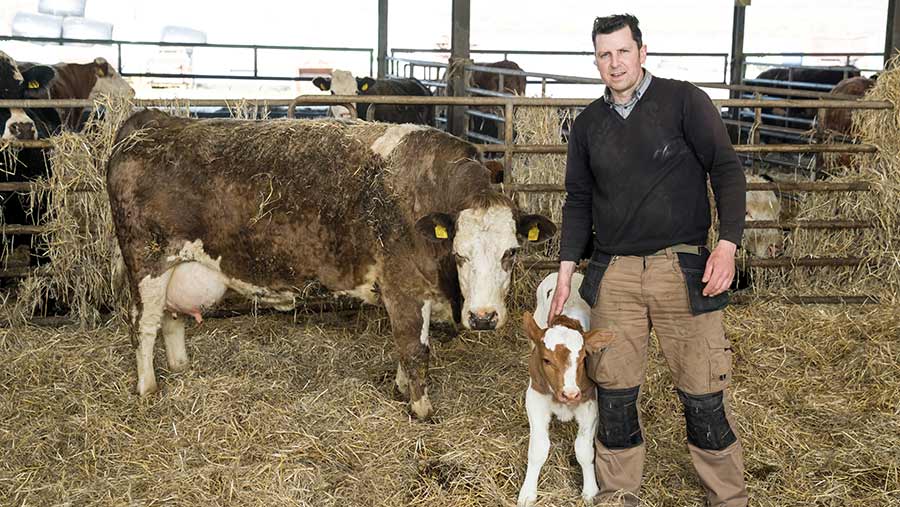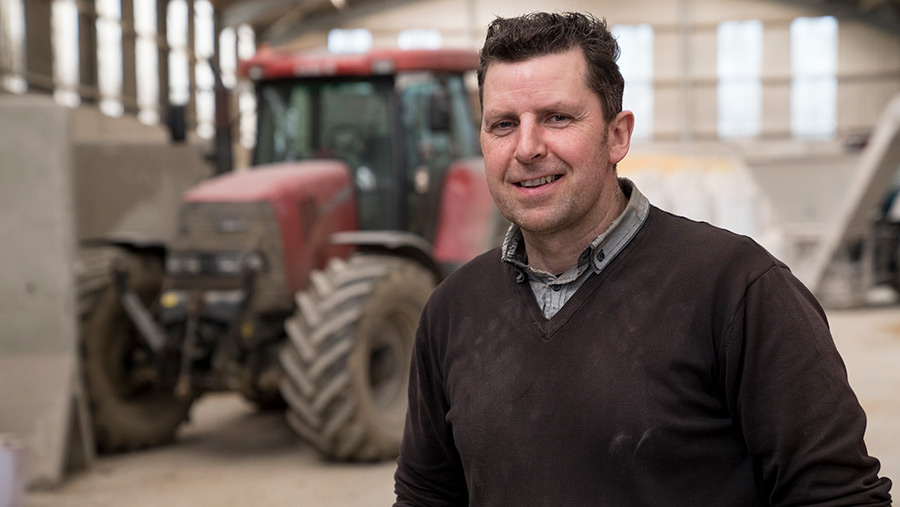Staffing and soil health key transition aims for suckler farm
 Fergal Watson © Steffan Hill
Fergal Watson © Steffan Hill Recruiting and retaining good farm staff is a key goal for Northern Ireland beef producer Fergal Watson.
Mr Watson runs a 285ha arable-beef setup, with wife Lucy and daughter Eabha-Marie, across three steadings near Cloughey on the Ards Peninsula, County Down.
All three are at sea level, and close to the coast.
See also: 7 top tips for attracting the right staff to your farm
Farm facts: Watson Farms
- Farm size: 285ha split across three units
- Enterprises: 170-cow suckler herd (Herefords and Stabilisers); beans, wheat, spring barley, oats
- Annual rainfall: 810mm
- Soil: sandy to medium loam
Transition goals
- Recruiting and retaining farm staff
- Restructuring suckler herd
- Improving business resilience
Staffing challenge
The farm has two long-serving staff – one arable worker and another on the suckler cow enterprise.
They have worked at the farm for more than 40 years and both are nearing pension age.
“Therein lies a major transition challenge,” says Mr Watson. “I am having to look at recruitment for the first time in my life.”
With the labour market at its most difficult for generations, the farm will need to stand out to attract the best people and hold on to them.
It has to be a good place to work and tasks must be manageable, he says.
Mr Watson has already completed what he calls “gritty jobs” before any new recruits arrive.
“Over the past year, we have spent £20,000 on fencing and gates. It makes the farms look up-together and signals to prospective employees that we are in good shape.”
It also means workers can focus on the important issues of growing crops and managing cattle.
Beef enterprise
At the same time, Mr Watson has taken steps to make the beef enterprise more manageable.
Previously, the farm had up to 300 continental crosses. But the herd has been cut back to 170 cows and is in the process of switching to Hereford and Stabiliser genetics.
One of the main reasons for the breed change is temperament.
Some of the continentals were ill-tempered, flighty and difficult to get going as calves, Mr Watson says.
“We no longer want to spend valuable time managing these bad traits while difficult animals might act as a deterrent to recruits.”
Reducing carbon
The switch to earlier maturing breeds should also reduce days to finish to a target below 24 months. This will cut overall feed use and reduce the farm’s carbon footprint.
Environmental costs will be further reduced by a move to home-grown feed.
“I have cut the amount of bought-in feed and will extend the arable rotation to include more beans.
“That will provide more protein for the ration and remove the reliance on bought-in soya blends, cutting the carbon footprint.”
The target is to cut out the bought-in protein and be 100% self-sufficient by the end of this year.
Moving to home-grown feed has the added benefit of better protecting the farm from future input price volatility.
Reducing the dependence on high-priced, artificial fertiliser, is something the farm is working hard to achieve.
All fields are soil tested every four years, providing a detailed insight into any nutrient shortfalls.
This is closely matched to levels in the farmyard manure from winter housing, and supplemented by slurry from neighbouring dairy units.
Increasing organic matter and soil testing are all part of a continuing process of soil improvement.

Fergal Watson © Steffan Hill
Grazing and soil health
Mr Watson plans to switch to multispecies swards, including red clover, chicory and plantains.
Use of the deeper rooting legumes will add nutrients to the soil and improve its structure making the sward more drought tolerant.
The introduction of cover crops within the rotation will further add to soil benefits.
Having a living root to improve soil structure and a canopy to protect the surface will be a boon to the farms’ mix of sandy to medium loams.
A healthier soil will retain moisture, nutrients and carbon in times of drought yet continue to be free-draining.
“As the soil structure improves, we aim to gradually ease back on ploughing and look to strip-till or min-till processes,” he says.
To date, the farm has not been in an environment scheme, but 2024 will bring a new agri-support system.
The basic area payment will be reduced and a resilient payment introduced – supplemented by a new Farming with Nature scheme.
“This is likely to be results-based, so if we deliver for the environment we will be financially rewarded. I firmly believe we can deliver for the environment while retaining production levels,” he says.
“If we get our plans right, the farm should be easier to manage, have a better carbon footprint and be more resilient to change, whether that is driven by the climate, economics or, most likely, both.”
Fergal Watson is one of our Transition Farmers. Join him as Watson Farms strives to become financially and environmentally sustainable and overcome the challenges it faces over the next five years.
